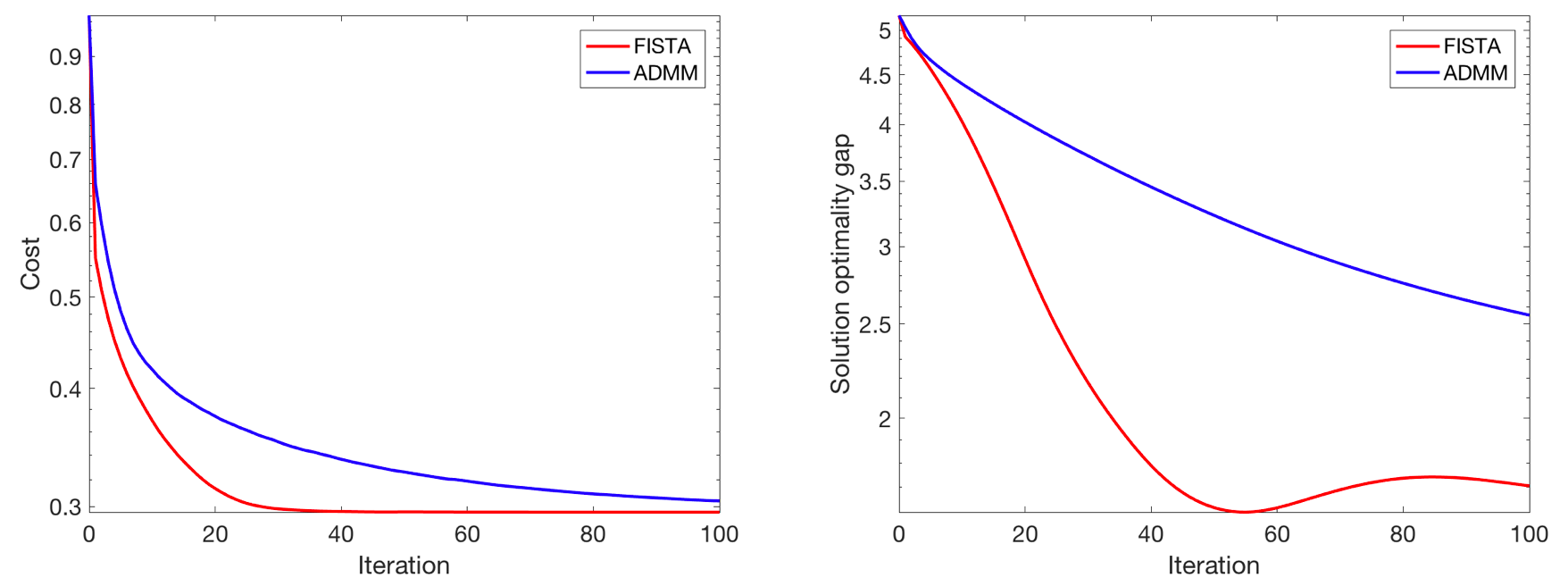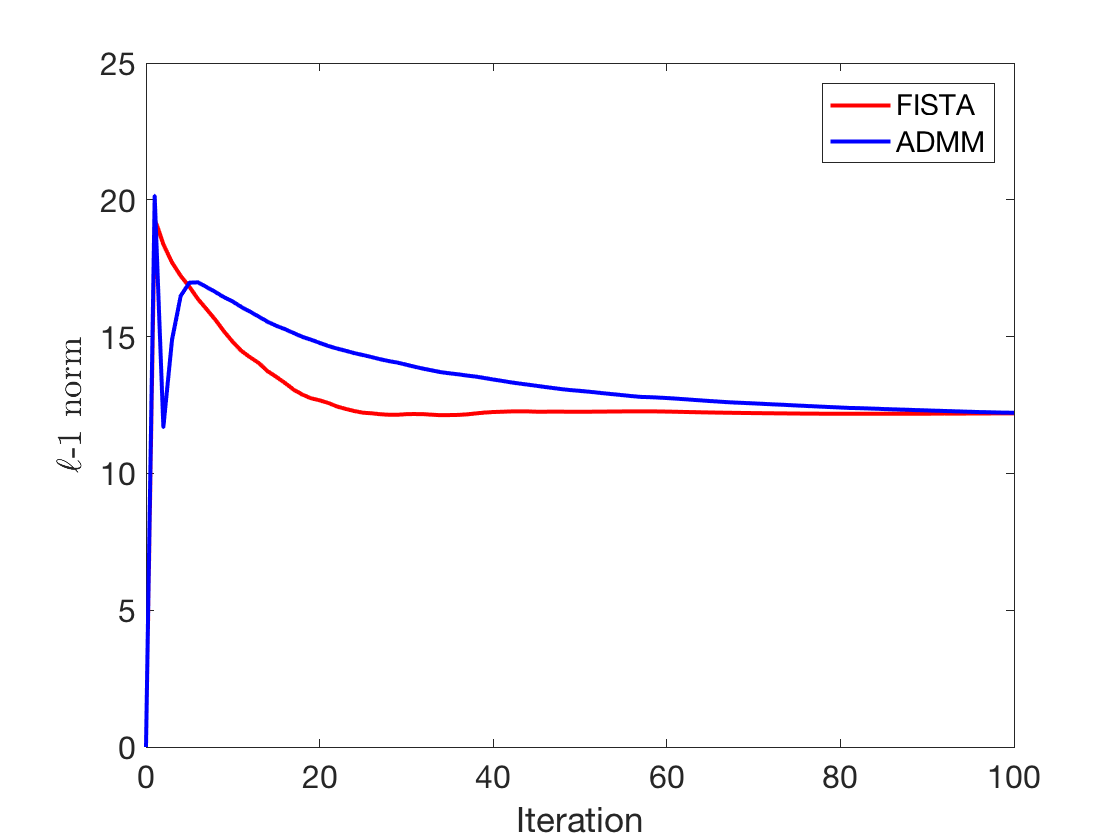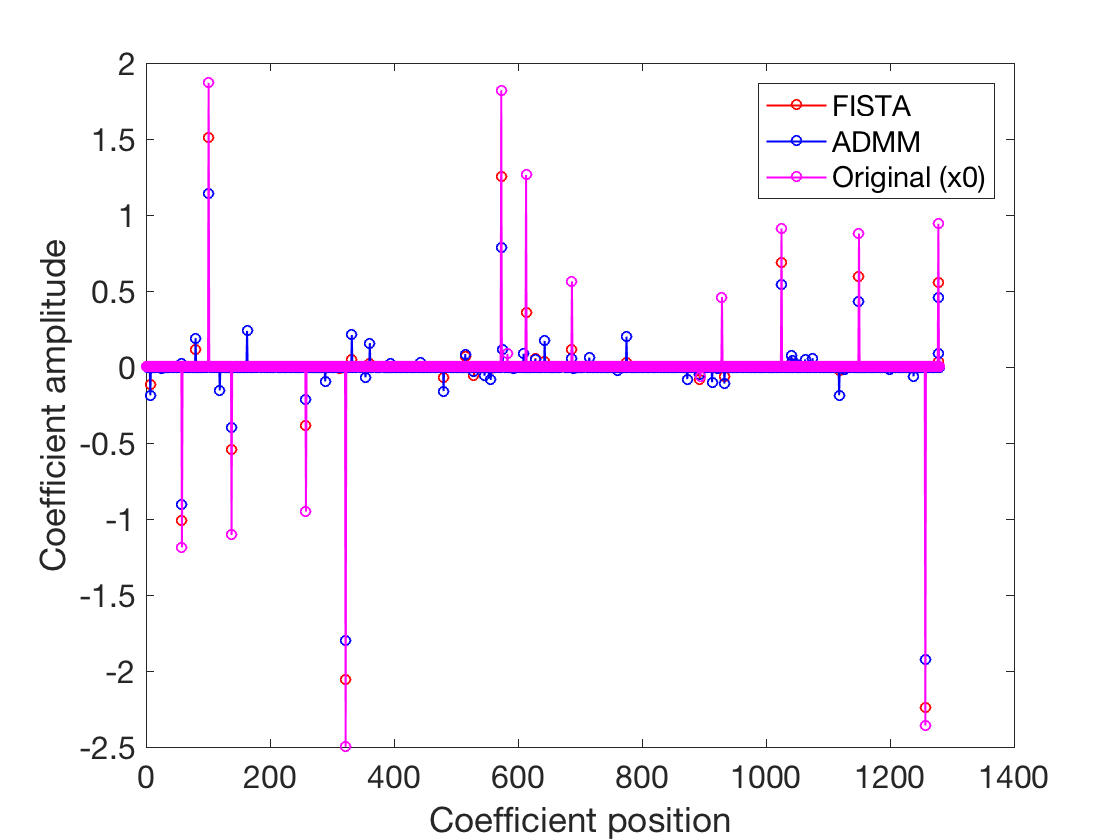Authors: Hiroyuki Kasai
Last page update: Oct. 15, 2018
Latest library version: 1.0.3 (see Release notes for more info)
The SparseGDLibrary is a pure-Matlab library of a collection of unconstrained optimization algorithms for sparse modeling.
- APG (Accelerated gradient descent, i.e., Nesterov AGD)
- ISTA (Iterative shrinkage-thresholding algorithm)
- FISTA (Fast iterative shrinkage-thresholding algorithm)
- CD (Coodinate descent) for Lasso and Elastic Net
- ADMM (The alternating direction method of multipliers) for Lasso
List of line-search algorithms available in SparseGDLibrary
- Backtracking line search (a.k.a Armijo condition)
- Strong wolfe line search
- Exact line search
- Only for quadratic problem.
- TFOCS-style line search
- Lasso (Least absolute shrinkage and selection operator) problem
- Elastic Net problem
- Group lasso problem
- Matrix completion problem with trace norm minimization
- L1-norm logistic regression
- L1-norm linear support vector machine (SVM)
- Robust principal component analysis (PCA) problem
- Video background subtraction application
- Image inpainting application
- Trace norm convex clustering problem
./ - Top directory. ./README.md - This readme file. ./run_me_first.m - The scipt that you need to run first. ./demo.m - Demonstration script to check and understand this package easily. ./demo_lasso_cv.m - Demonstration script for lasso problem with cross validation. |plotter/ - Contains plotting tools to show convergence results and various plots. |tool/ - Some auxiliary tools for this project. |problem/ - Problem definition files to be solved. |sparse_gd_solver/ - Contains various gradient descent optimization algorithms. |sparse_gd_test/ - Some helpful test scripts to use this package.
Run run_me_first for path configurations.
%% First run the setup script
run_me_first; Usage example 1 (Lasso problem)
Now, just execute demo for demonstration of this package.
%% Execute the demonstration script
demo; The "demo.m" file contains below.
% set number of dimensions, cardinality and noise level.
n = 1280;
d = 100;
k = 15;
noise_level = 0.01;
% generate dataset
[A, b, x0, lambda] = generate_lasso_data(n, d, k, noise_level);
% define problem
problem = lasso_problem(A, b, lambda);
% perform algorithms (FISTA and ADMM)
options.w_init = zeros(n,1);
[w_fista, info_fista] = fista(problem, options);
[w_admm, info_admm] = admm_lasso(problem, options);
% plot all
% display iter vs. cost
display_graph('iter','cost', {'FISTA', 'ADMM'}, {w_fista, w_admm}, {info_fista, info_admm});
% display iter vs. l1-norm
display_graph('iter','sol_optimality_gap', {'FISTA', 'ADMM'}, {w_fista, w_admm}, {info_fista, info_admm}); - Output results
The decrease of the l1-norm of the solution according to iterations is illustrated.
display_graph('iter','l1-norm', {'FISTA', 'ADMM'}, {w_fista, w_admm}, {info_fista, info_admm}, 'linear');The final coefficients in each position of the solution are displayed in comparisn with the ogirinal input sparse signal.
display_graph('coeff_pos','coeff_amp', {'FISTA','ADMM','Original (x0)'}, {w_fista, w_admm, x0}, {w_fista, w_admm, x0}, 'linear', 'line-with-mark', 1); - Output results
Usage example 2 (Lasso problem with cross-validation)
Execute demo_lasso_cv for the lasso problem with cross-validation.
% Execute the demonstration script
demo_lass_cv; The "demo_lass_cv.m" file contains below.
function demo_lasso_cv()
% set number of dimensions, cardinality and noise level.
n = 1280;
d = 100;
k = 15;
noise_level = 0.01;
% generate dataset
[A, b, ~, ~, lambda_max] = generate_lasso_data(n, d, k, noise_level);
% set algorithms and solver (e.g., FISTA)
algorithm = {'FISTA'};
% initialize
% define parameters for cross-validation
num_cv = 10;
lambda_unit = lambda_max/num_cv;
lambda_array = 0+lambda_unit:lambda_unit:lambda_max;
% prepare arrays for solutions
W = zeros(n, num_cv);
l1_norm = zeros(num_cv,1);
aprox_err = zeros(num_cv,1);
% set options
options.w_init = zeros(n,1);
% perform cross-validations
for i=1:length(lambda_array)
lambda = lambda_array(i);
problem = lasso_problem(A, b, lambda);
[W(:,i), infos] = fista(problem, options);
l1_norm(i) = infos.reg(end);
aprox_err(i) = infos.cost(end);
end
% plot all
% display l1-norm vs. coefficient
display_graph('l1-norm','coeffs', algorithm, l1_norm, {W}, 'linear');
% display lambda vs. coefficient
display_graph('lambda','coeffs', algorithm, lambda_array, {W}, 'linear');
% display l1-norm vs. approximation error
display_graph('l1-norm','aprox_err', algorithm, l1_norm, {aprox_err}, 'linear');
end
- Output results
The SparseGDLibrary is free and open source for academic/research purposes (non-commercial).
If you have any problems or questions, please contact the author: Hiroyuki Kasai (email: kasai at is dot uec dot ac dot jp)
- Version 1.0.3 (Oct. 13, 2018)
- ISTA solver is added.
- Version 1.0.2 (July 07, 2017)
- Robust PCA problem and trace norm convex clustering problem, and those related solvers and test files are added.
- Version 1.0.1 (April 27, 2017)
- Group lasso problem is added.
- Version 1.0.0 (April 24, 2017)
- Initial version.



